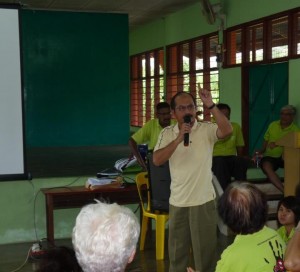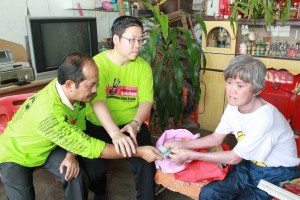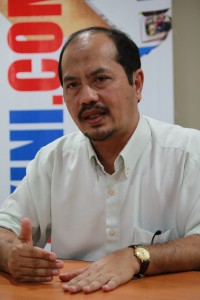For Tengku Zulpuri Shah bin Raja Puji (pic) or Tengku Zul, embracing and celebrating differences is second nature for him since young. Unsurprisingly, DAP became the natural fit for his choice of struggle. As the deputy chairman of Pahang DAP, he talks candidly on why DAP and PR is the best platform to improve the Malays’ plight.
The opposition has never come close to winning in Pahang. Is it a given that Pahang will stay BN-blue in the next GE?
Dato Seri Najib Tun Razak himself almost lost the 1999 general elections (GE) due to the infamous Anwar’s black eye incident. It proves one thing: BN’s enemies are not just PR; the internal enemies are just as destructive.
Another misconception on the civil service: many civil service officials are not BN supporters. They are also sympathetic towards us; it’s just that they are under legal and administrative constraint from showing their support.
As a result of the pressure and protest votes from within BN and the civil servants coupled with the people’s rising awareness, Najib was almost defeated.
To be fair during that 1999 contest, Najib was up against a humble, smart and friendly candidate in the person of Ustaz Ramli. His meet-the-people programs were more systematic and he was frequently on the ground amongst the people. It was also the candidate factor that almost felled Najib then.
Has things changed then, especially for the Malays, since 2008?
The Malays are by nature mild-mannered and gentle even when protesting. Perhaps its to do with their upbringing and culture. However in the present situation, change is coming for sure. Even if the Malay is angry with UMNO, he will lay low and vote PR
The youths who work in the cities, whether Malays, Chinese or Indians, are generally more informed as they are exposed to alternative media and the internet. We see this happening especially in the universities. In addition the various NGOs such as ANAK are opening the eyes of the children and their parents as well.
Since 2008 alternative information has played a big role for the people and the politicians as well. Now they have to get to the ground more often to work and explain to the people.
The limited information in the government-controlled TV, radio and mainstream newspapers media are being cirmcumvented with the rise of the internet and alternative media. It’s good, the people can value and obseve for themselves. They are rising up.
Touching on the FELDA settlements, what can you tell us?
The common perception that FELDA settlements, especially in Pahang, are overwhelmingly Malay and conservative in outlook means it is by extension a rock-solid constituency for UMNO needs to be corrected. In the 1999 GE, PAS managed to win four FELDA DUNs in Pahang. The FELDA Malay votes are not a sure thing anymore for UMNO.
 Many of the settlers’ children who are studying and working in the cities are exposed to alternative information and media.They are bringing the news to their parents.
Many of the settlers’ children who are studying and working in the cities are exposed to alternative information and media.They are bringing the news to their parents.
In the past, there was no NGOs or individuals who question about the FELDA operations. They (the settlers) would be told, “Here’s the money and goodies” yet the accounts are not reviewed to them. There’s no transparency in their operations.
ANAK has been on the ground consistently, holding ceramahs and distributing leaflets and visiting the settlers’ homes. Often when leaflets are given to the villagers they are unable to comprehend what is going on. One needs to to sit down, have a long chat and show videos to them. Then they are able to comprehend what is going on.
The Malays, especially the settlers, are now aware of what’s going on about the FGVH. Whatever information we give them now they will accept and consider it.
When the settlers’ children bring back this information and questioning mentality, the settlers are being made aware of their rights and have risen up to protest. So now we see Najib busy dishing out the RM 15,000 and calling it “promises fulfilled.”
The Malays are now getting aware of the FELDA scams.
What are the issues for the Malays and Pahang?
In Pahang, UMNO is busy enriching themselves. It’s the same everywhere. Whatever the programs that are organised, they don’t benefit the people much. Even the state-linked corporations are losing money to mismanagement.
Pahang is a state rich with natural resources, yet we are saddled with RM 2.2 billion of debt. Now, cyniade is used to mine gold in Pahang, spewing poison and causing much hardship for the people. In Raub, the RAGM gold mine has been given 12 years of tax exemption. What’s the return to the state and people? Nil. And the jobs are not for Raub residents either.
Pahang is rich but the people aren’t benefitting as a result of corruption. The Pahang BN leaders are really low class. They encourage hazardous and high risk investments, but does it benefit the state and people? Do they provide health and safety assurances? The soon to be operational Lynas rare-earth refinery is another good example of this shallow thinking. The people are definitely not being put first.
What are DAP’s challenges in attracting the Malays?
Pahang DAP leaders need to be constantly on the ground in the Malay areas to explain about DAP’s struggle. Even for PR’s Malay supporters, they are more inclined towards PAS. DAP needs to show substantively more that it is a party for all races, not just for Chinese and Indians
To effect political change, we need to change. We need to be open-minded. If we are to continue with our narrow racial and religious orientation, such as Malays with PAS and Chinese with DAP, we wouldn’t get anywhere. Now we are seeing the fruits. The Malays have more choice in the form of PAS, PKR and DAP.
I believe in meritocratic system. We know that DAP is not for one race only, however the Malays perception has been coloured towards it. For DAP, we need visible Malay leadership at the highest echelon. When the Malays knows that there are senior Malay leaders in DAP, their confidence towards DAP will increase.
 In Pahang we are well-represented. Leong Ngah Ngah is the chairman, I am the deputy chairman and Apalasamy is the vice chairman. We have a good mix and we are showing it by example at the leadership level. It will take some time for it to be followed at the grassroot level.
In Pahang we are well-represented. Leong Ngah Ngah is the chairman, I am the deputy chairman and Apalasamy is the vice chairman. We have a good mix and we are showing it by example at the leadership level. It will take some time for it to be followed at the grassroot level.
Many Malays have told me that they want to join DAP. But for the party leadership we need to be careful. Will their sudden influx give risk to the party or its election campaigns? We don’t want these instant members who may later be bought over by UMNO during GE. This is not our aim. We fight for what the party stands for.
A Vessel By Any Name
I was raised in a PAS political family. My father was the former deputy state commissioner of Pahang PAS and committee member at the national level. Naturally PAS politics was front and centre in my family. However my perspective towards Islamic politics is broader.
After the 1999 GE, I realised that PAS and DAP cannot run the country by themselves. As long as both parties are divided, BN will continue to ruin this country with its divide and rule policy. After a long discussion with my father, I became a DAP member in 2000. I saw that as the best choice to overcome the racial and religious barriers wrought by BN.
Although I was offered to be a DAP candidate in the 2004 and 2008 GEs, I wasn’t ready then. For me the party struggle is a demand and service. -The Rocket





Pingback: Pembangunan Bandar dan Luar Bandar: Ekonomi Manusiawi Negeri Pahang « Chean Chung 李健聪
Very well written and it is the truth.